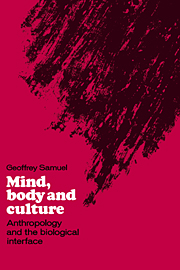Book contents
- Frontmatter
- Contents
- Preface
- 1 New paradigms and modal states
- 2 A natural science of society
- 3 Starting points I
- 4 Starting points II
- 5 Interpreting the flow
- 6 The multimodal framework
- 7 The Ndembu modal state repertoire
- 8 Sociocentric modal states
- 9 Shamanic mechanisms
- 10 The growth of the clerical approach
- 11 Technical and transformational mechanisms
- 12 Mind, body and culture
- Notes
- References
- Index
11 - Technical and transformational mechanisms
Published online by Cambridge University Press: 04 September 2009
- Frontmatter
- Contents
- Preface
- 1 New paradigms and modal states
- 2 A natural science of society
- 3 Starting points I
- 4 Starting points II
- 5 Interpreting the flow
- 6 The multimodal framework
- 7 The Ndembu modal state repertoire
- 8 Sociocentric modal states
- 9 Shamanic mechanisms
- 10 The growth of the clerical approach
- 11 Technical and transformational mechanisms
- 12 Mind, body and culture
- Notes
- References
- Index
Summary
This is the last of the sequence of chapters in which we have been discussing modal-state mechanisms in human societies. In this chapter we look at the societies in which most readers of this book probably live: the modern industrial societies of North America, Western Europe and Australasia. I refer to these for convenience as ‘modern Western societies’.
I begin by examining some of the factors associated with the emergence of this type of society. A discussion of modal states in modern Western societies follows. This suggests that the shamanic mechanisms discussed in chapters 7 to 9 are a sub-group of a wider class of mechanisms. I refer to this wider class as transformational mechanisms and contrast them with the technical mechanisms more familiar within modern Western societies. I compare the distinction between technical and transformational mechanisms with similar distinctions in the work of Martin Southwold and Roy Wagner. Finally I make some comments about the nature of value-systems in different types of society.
The concomitants of rationalization
In the previous chapter we noted that the process of rationalization and the development of political hierarchy are closely associated. While we should be wary of regarding modern Western societies as some kind of evolutionary product of these developments, there is, nevertheless, a sense in which modern Western societies have taken both these developments considerably further than any previous human societies known to us.
- Type
- Chapter
- Information
- Mind, Body and CultureAnthropology and the Biological Interface, pp. 136 - 151Publisher: Cambridge University PressPrint publication year: 1990



